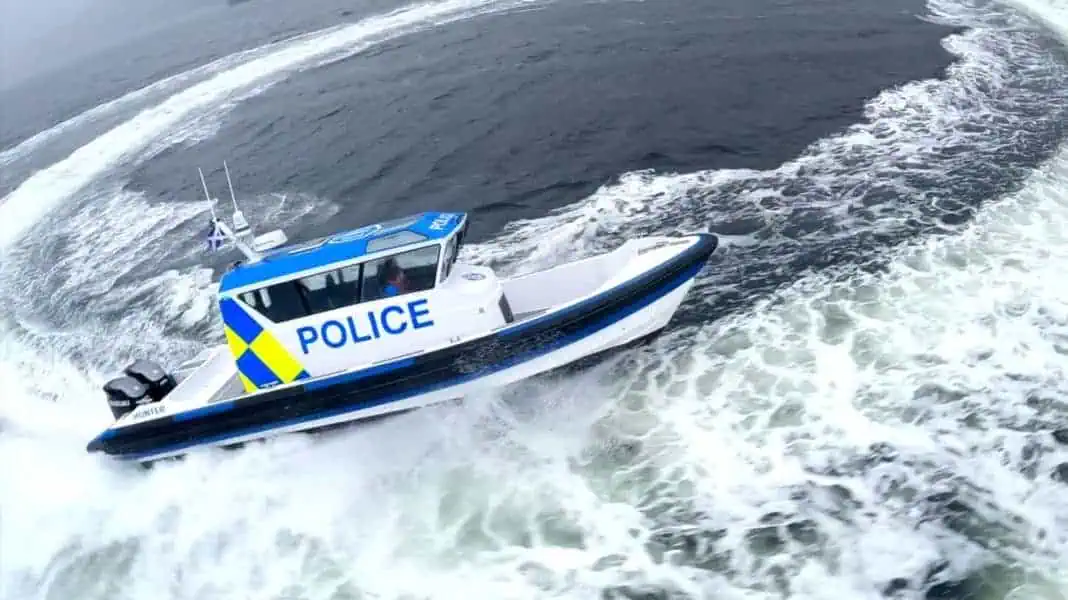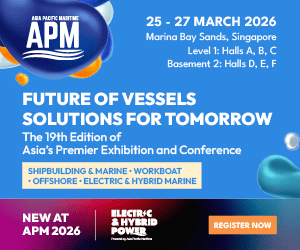- Glasgow based Ultimate Boat Company has invented a new sustainable boat building material ‘Danu’ which can replace fibre glass built boats
- Ultimate Boats is seeing production increase with workboats delivered to Police Scotland and Orbital Marine Power’s tidal turbine
- New partnership with Arizona hydrogen propulsion specialist RONN seeks to push boundaries further with the creation of new hydrogen powered workboat
After two decades as a chartered accountant, Shane Mugan wanted to do something completely different. It could have been anything; it just happens to involve boats.
That was thanks to a chance meeting on a ski lift in Colorado in 2015 when Mugan found himself talking to Adm Michael Silah, who had just retired as director of the US National Oceanic and Atmospheric Administration. The two men skied together for a few days and Mugan saw that Silah’s experience and military focus would complement his embryonic ideas.
“I was keen to do something that was product-related and intellectual in terms of devising neat solutions,” Shane Mugan told Workboat365. The two men defined a few parameters for their technical challenge. “It had to be revolutionary and it had to be something that was going to force industry to reconsider what it was doing and how it was doing it,” he said.
But which industry? He was a keen sailor and Silah’s US Navy background made maritime an attractive area to explore. As they looked at areas of development being explored by others, they realised that “no organisation was really focused on the evolutionary status of the marine industry”.
They identified two areas that were ripe for revolution: one was a recyclable alternative to glass fibre and the other was hull design, to improve the load capacity of high speed craft. With these twin ambitions, Mugan founded two UK-based organisations: ExoTechnologies – headquartered on the Isle of Man and which would go on to develop a recyclable material that could be used across many industries – and Ultimate Boats, based in Glasgow, Scotland, to use the material to develop workboats and high performance military craft as well as motorboats for the leisure industry.
“Building in glass fibre is not a nice business,” Mugan said. It is unpleasant to work with and “you can’t manage quality very well”. It is also very difficult to recycle leading to many boats being dumped into landfill or scuttled.
In searching for an ecological alternative, Mugan and Silah discovered that Dutch yacht racer Jeroen Wats was also exploring ecological boatbuilding and had begun developing a system that used a mineral fibre instead of glass; “we acquired Jeroen’s business and brought him into the leadership of the organisation, he has such a wealth of knowledge of high performance yachting and sailing at a competitive level,” Mugan said.
Wats’ material has a rare quality: once it reaches the end of its useful life, it will be possible to separate the fibres from the polymer and reuse both, Mugan explained. It is a property that aligns with the development project’s title, Danu, which is the name of the Irish mythical god of Mother Earth, he added.
ExoTechnologies has secured the UK patent covering the material’s manufacturing process and although the material can be used for many purposes including wind turbine blades, ExoTechnologies is initially focusing on its maritime potential. It has teamed up with leading planing hull hydrodynamicist John Moxham, who was for many years involved in designing high-speed aircraft before moving on to boat design about 40 years ago.
He had been exploring how to increase load capacity on planing craft by applying aeronautical concepts to their hulls and his ideas have been incorporated into the designs being offered by Ultimate Boats.
Using a 1:10 scale model of one of Moxham’s existing military boat designs, a high-speed film of its performance was made before modifications that he proposed were applied and a further test was done. “It was immediately obvious that this was the breakthrough”, Mugan recalled.
In June 2022, Ultimate Boats delivered the world’s first fully recyclable work boat: an 11m high-performance patrol boat powered by twin outboard motors delivering a total of 700hp. Its design is dubbed the M-Class, and its first customer is Police Scotland. More boats have since been built for other UK Police Forces and clients including a major break through in offshore renewables. In August Ultimate delivered an 11 metre O-class workboat designed to transport up to eight engineers to Orbital Marine Power’s tidal turbine, the biggest of its kind in the world operating off Orkney.
Building on recent successes Mugan wants to expand production. With its current resources, Ultimate Boats can build about 25 craft each year, but could produce 100 per year with investment in facilities and recruitment to operate two shifts. It is working with corporate services provider KPMG to secure investment, in particular to increase the number of hulls that can be laid up at any time, which currently stands at two.
Alongside this expansion programme, ExoTechnologies and Ultimate Boats is extending the range of designs they can offer specifically for the offshore and defence sectors. Its design range began with a 7.5m concept, quickly followed by 13m and 11m versions. Moxham is currently working on a 9m version and Mugan believes that its infusion method of creating the material should make 30m craft achievable, based on current practice in glass fibre boatbuilding.
“We are speaking to numerous defence partners as well as offshore companies,” said Mugan. “We are further actively exploring innovative clean propulsion systems via a new partnership with Arizona-based hydrogen car and truck maker the RONN. Here we are aiming to develop a clean hydrogen electric propulsion solution for our boats.”
“Both the military and renewable sectors are searching for more sustainable environmentally friendly solutions. We have invented a sustainable circular solution to fibreglass which saves money, improves performance and prevents the ecological time bomb of fibreglass built boats littering the seabed or being dumped in landfill.
Hydrogen propulsion will enable us to take another leap forward. This is the right place and right time to innovate for workboat sector hungry for change.”
Mugan would like to explore how Danu could benefit wider defence operations. It is, for example, remarkably strong, to the extent that it has withstood bullets in ballistic tests making it a perfect choice for the military workboat market.
Craft such as those will clearly not use the planing hulls that Moxham is working on and Mugan confirmed that Ultimate Boats would also build more conventional hull forms when requested. In addition, it could also supply Danu and their know-how to other builders keen to apply its benefits to their own projects.
Danu offers strength and consistency
Danu uses a mineral fibre that is set into a polymer resin using an infusion process Shane Mugan said. It creates a composite material that is exceptionally strong but can be recovered, recycled and reused repeatedly, and its patent application “addresses how you formulate it, how you process it and how you recycle and recover it”, Mugan explained.
As with traditional fibre composites, Danu’s fibres are formed into mats that are laid into gel-coated moulds. But each mat has a defined shape and location, making the process both precise and repeatable, Mugan said. Resin is then added using a vacuum infusion technique that draws it through the fibres. This is better for employees to handle and delivers a more consistent product, he said.
In addition, a 2.4mm thickness of Danu has the same tensile strength as a typical glass fibre structure 7mm thick. But current regulations governing such materials require them to be 7mm thick, although Mugan hopes to challenge this.
Danu offers a higher impact resistance than carbon reinforced material and its mineral fibres are superior to glass, meaning that fewer are needed, leading to a weight reduction. Danu is also hydrophobic, so it will never suffer from osmosis.
After about four years of work and significant investment, “we have shown that you can create a sustainable composite material”, Mugan said. And to get to the point of delivering its first boat took nearly two years working closely with Police Scotland, “giving them the confidence that what we were doing was going to have a credible outcome”, he said.
There is still more to discover about the material and ExoTechnologies has asked a number of organisations if they would like to be involved in R&D projects to explore its benefits. “The answer generally is yes”, Mugan said.












